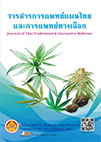Solutions to the Problem of Misappropriation of Traditional Knowledge: A Study on the Concept, International Trends and Laws in Foreign Jurisdictions N/A
Main Article Content
Abstract
The developing countries are rich in traditional knowledge belonging to local and traditional communities around the countries. This traditional knowledge has so much value that the developed countries come to exploit for their use in industrial developments either use of knowledge itself as the foundation for the inventions and then gain the intellectual property protection in form of patent, or use of knowledge about genetic or biological resources to develop the new process and then the intellectual property protection. However, the communities which are the origins of this traditional knowledge are not informed of the use and intellectual property protection because the use takes place without the permission from the communities. Therefore, the developing countries and the relevant international communities propose a number of solutions for this problem. In this article, it studies from the research document concerned with the exploitation and solutions for this problem, together with international agreements, the laws in other countries and the laws in Thailand. This article suggests that the solution should be an legal amendment to force the disclosure of traditional knowledge in the process of patent application and this disclosure must be conditional to the patent application or mandatory. This is in line with the laws in other countries. Furthermore, in the meantime, there is a proposal for amendment in TRIPS agreement together with the drafting of traditional knowledge protection agreement by the World Intellectual Property Organization, which also suggest to mandate the disclosure of traditional knowledge in the process of patent application.
Article Details
References
2. Long DE. The impact of foreign investment on indigenous culture: An intellectual property perspective. N.C. J. Int'l L. 1998;23:247-54.
3. World Intellectual Property Organization. WIPO Technical study on patent disclosure requirements related to Genetic resources and Traditional knowledge, the seventh meeting of the Conference of Parties to the Convention on Biological Diversity. Malaysia; 9-20 Feb 2004. p. 37.
4. Coombe RJ. The recognition of indigenous peoples’ and community Traditional knowledge in international law. St. Thomas Law Review. 2001;14:278.
5. Marden E. The neem tree patent: international conflict over the commodification of life. B.C. Int'l & Comp. L. Rev. 1999;22(2):281-2.
6. Dolder F. Traditional knowledge and patenting: The experience of the neemfungicide and the Hoodia cases, Biotechnol Law Rep. 2007;26(6):583-87.
7. Schmidt DE. Postcard from the reality-based universe : Wish you were all here : a mediation on the relationship between science, intellectual property law, and the rights of indigenous populations in plant genetic resources. Environ Law. 2008;38:332.
8. Wager H. Biodiversity. Traditional knowledge, and folklore: Work on related IP matters in WTO, intercultural hum. Rts. L. Rev. 2008;3:215-6.
9. de Carvalho NP. Requiring disclosure of the origin of genetic resources and prior informed consent in patent applications without Infringing the TRIPS Agreement: The problem and the solution. WASH. U. J. L. & POL’Y. 2000;2:375.
10. Henninger T, Disclosure requirements in patent law and related measures: A comparative overview of existing national and regional legislation on IP and biodiversity. ICTSD. Switzerland. 2009. p. 3.
11. Ong B. Harnessing the biological bounty of nature: mapping the wilderness of legal, socio-cultural, geo-political, and environmental issues in Burton Ong (ed). Intellectual Property and Biological Resources. 2004. p. 11.
12. de Werra J. Fighting against biopiracy: Does the obligation to disclose in patent applications truly help?, Vanderbilt J Transnat’l L. 2009;42:158.
13. Intergovernmental Committee on Intellectual Property and Genetic Resources, Traditional Knowledge and Folklore, Glossary of Key Terms related to Intellectual Property and Genetic Resources. Traditional Knowledge and Traditional Expression prepared by the Secreatariat, Twenty-Third Session, Geneva, 4-8 Feb. 2013. WIPO/GRTKF/IC/23/INF/8. p. 11.
14. Hoare AL, Tarasofsky RG. Asking and telling: Can “Disclosure of Origin” requirements in patent applications make a difference?. Journal of World Intellectual Property. 2007;10:158.
15. Martin G. Transparency measures under patent law regarding genetic resources and traditional knowledge. World Intell Prop. 2004;7(4):10.
16. Kogan LA. Brazil’s IP oppotunism threatens U.S. private property rights, U. Miami Inter-Am. L. Rev. 2006;(38):71-2.


